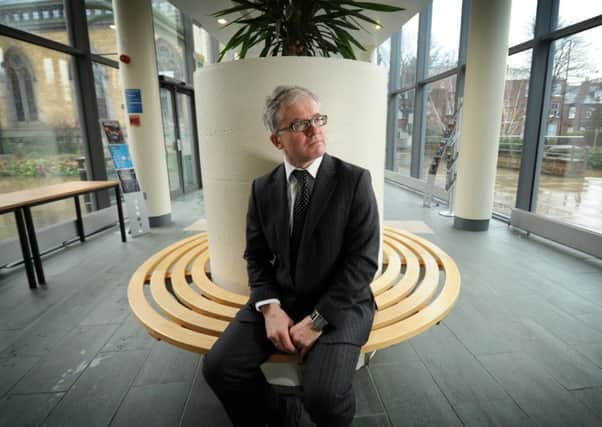BoE’s Miles says rates may never return to ‘normal’ levels


Speaking after a lecture at Leeds University Business School, the economist said the Bank should not rush to increase interest rates.
This is in contrast to central bank colleague Martin Weale who said the Monetary Policy Committee could raise rates next spring.
Advertisement
Hide AdAdvertisement
Hide AdMr Miles told the Yorkshire Post: “I don’t think we should be in any hurry on the monetary policy committee to raise interest rates in the very near term because it looks to me like there is a fair degree of slack in the economy and the inflation outlook is much more benign and inflation pressures subdued than they have been for the most of the last five years.
“I also suspect that when the time comes, the right strategy is to very gradually move interest rates back up to something that’s a bit more normal.”
Asked what he meant by normal, Mr Miles said: “That’s a good question. Five per cent was the average in the ten years between the MPC being formed in 1997 and the eve of the financial mess.
“If you take the 320-year period since the Bank of England was established in 1694, it turns out the average bank rate was also 5 per cent.”
Advertisement
Hide AdAdvertisement
Hide AdHe added: “Actually I think there are some pretty strong reasons why what you call the new normal is likely to be quite significantly lower than that.
“One reason is that the spread between the bank rate that we in the Bank of England can set and the average rate of mortgages... I suspect is going to be quite a lot bigger for the foreseeable future than it was in between 1997-2007.
“In that ten-year period when bank rate was five per cent, it wasn’t that difficult to find a mortgage that had an interest rate that was close to 5 per cent. The spread had fallen to very low levels.
“In retrospect I think that was probably unsustainable and I very much doubt we are going to get back to that position for many, many, many years, maybe not ever.
Advertisement
Hide AdAdvertisement
Hide Ad“Currently that spread is much bigger. Bank rate is 0.5 per cent and perhaps a rate you might get on a mortgage is 3.5, nearer 4 per cent.
“That spread is probably higher than it will become but I don’t think we are going to get back to virtually zero spread.
“If that’s right, then other things equal, the level of bank rate that’s the new normal is going to be lower than the 5 per cent that was normal in that period 1997-2007. 5 per cent is probably an overestimate of where new normal might be.”
Asked when the Bank of England might start reversing its £375bn bond-buying programme - known as quantitative easing - Mr Miles said: “A reversal of QE, a selling of the assets we bought, is an element of that tightening in monetary policy.
Advertisement
Hide AdAdvertisement
Hide Ad“I don’t think it’s the first element. I think the natural thing is that when we do come to make monetary policy a bit more normal, it is going to be bank rate that is the first thing we move.
“It’s a ways down the road before we get a position of unwinding, significantly, the assets that we have bought.”
Mr Miles was in Yorkshire to meet local businesses. He said they expressed guarded optimism about their prospects, though this varied greatly between different sectors.
“Whichever may you cut it, (they are) far more positive than even 12 months ago, let along 24, 36 months ago. People are seeing a return of growth. It is feeding through to the economy here,” he said.
Advertisement
Hide AdAdvertisement
Hide AdMr Miles said the Yorkshire economy is in a different place from the South East and London, particularly in terms of the housing market and construction, but he added that stories about a housing bubble are “ahead of the facts” with net mortgage lending, transactions and new homes built still significantly lower than during the years leading up to 2008.
But he added: “What you ideally would like to see is more balanced growth across the regions.”
Asked about the low level of exports, Mr Miles said manufacturers are not helped by their biggest market, Europe, being “flat on its back - it’s not growing at all”.
“I don’t think that situation is going to turn around very dramatically in the next 6-12-18 months and the outlook for growth in the euro area is not terribly positive.
Advertisement
Hide AdAdvertisement
Hide Ad“That’s probably the single biggest factor behind what frankly has been a quite disappointing performance for UK exports as a whole.”
Mr Miles joined the Bank of England’s Monetary Policy Committee in June 2009. He is a professor at Imperial College London and a former chief UK economist at investment bank Morgan Stanley.